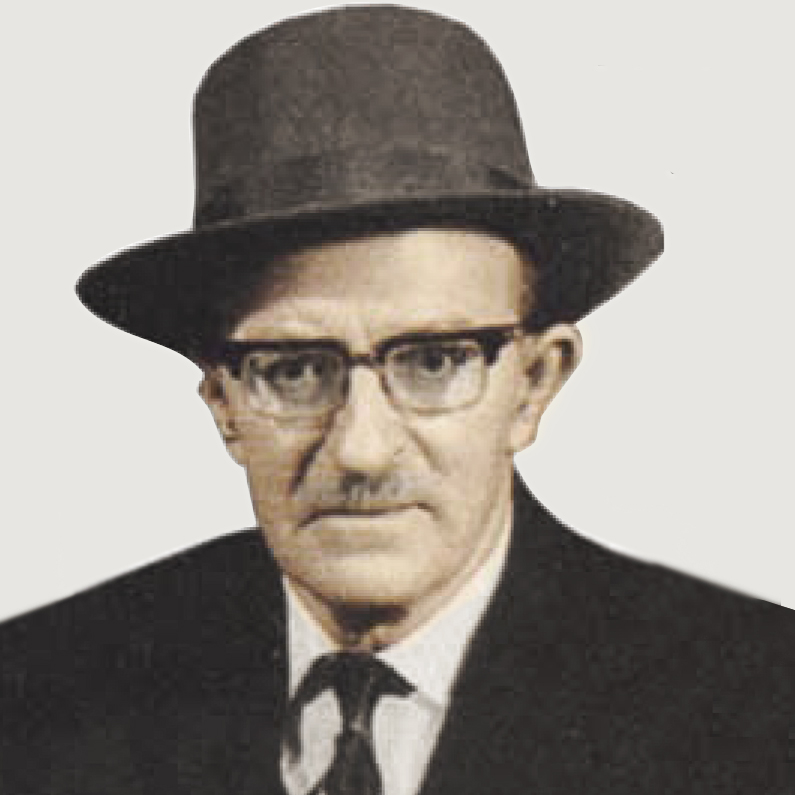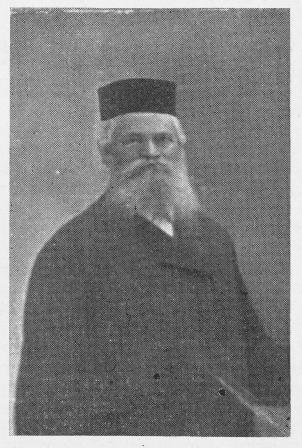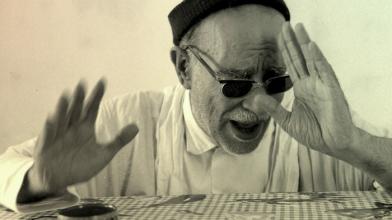Rahamim Amar was born in 1898 in the Jewish quarter of the Old City of Jerusalem. His father’s family was of Sephardic origin from Saloniki. His mother's family, named Parnas, was among the exiled Jews from Spain who settled in Jerusalem and according to family tradition, lived in the city for twenty generations.
He started his music career as a trumpet player in the British Police Band, which he joined as a youth after the beginning of the British Mandate in Palestine. After his release from the police, he began to play other musical instruments, especially plucked string instruments, some of which he built. Later on, he started playing the violin, which became his main instrument for the rest of his life and also acquired proficiency in the use of Western musical notation.
Amar’s career as a performing musician developed in several parallel venues. He would play with various Arab ensembles and perform in cafes and clubs in Jaffa, where he lived. He would also travel to Arab villages to play at events and celebrations. According to the hazzan and payyetan Yaacov Cohen (1991/2: 132), who worked with him, Amar used to play with an Arab-Jewish ensemble during the breaks in silent movie theaters. After 1948, such shared Arab-Jewish scene in Palestine almost disappeared. Yet, Amar continued to play at family celebrations in the Jewish sector of Israel as part of his professional career.
At the same time, since 1936, he joined Ezra Aharon, a newcomer musician from Iraq who enjoyed great prestige in the Arab world. Amar first joined the ensemble established by Aharon, Kokhavei Hamizrah (The Oriental Stars).
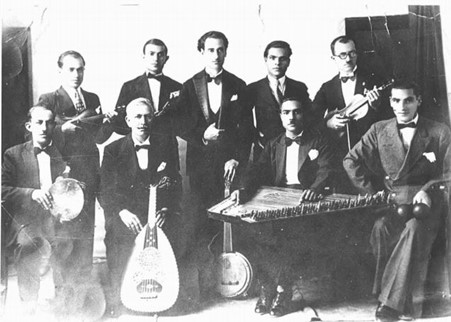
Kokhavei Hamizrah, ca. 1936. Rahamim Amar is the first standing from the right. Ezra Aharon is standing at the center, holding a Turkish cümbüş. Photo from the Ezra Aharon private collection, courtesy of Dr. Esther Warkov.
Soon after that, Amar became Aharon’s partner in the Hebrew section of the Palestine Broadcast Service (PBS), the radio station established by the British Mandate, thus starting a long career as a radio studio musician. The duo Aharon and Amar played steadily in short fifteen-minutes long programs generally listed as “Oriental Melodies” (Ne’imot mizrahiyot). This collaboration ended in 1948 with the demise of the British Mandate and the transformation of PBS into Kol Israel (Voice of Israel). The reasons for the end of this partnership are unknown; the fact is that when Ezra Aharon returned to performed in Kol Israel in late 1948 in programs not unlike the ones he shared with Amar at the PBS, the Jerusalemite violinist was not his partner any more. Yet, the cooperation for about a decade with an experienced composer such as Ezra Aharon certainly had an impact in Amar’s late career. Moreover, his appearances in the radio provided him exposure to a wide audience that after 1948 will continue to attend his performances or collaborate with him.
After 1948 Amar, perhaps because he was “liberated” from the partnership with Ezra Aharon, dedicated more efforts to three activities: composition, choral conducting (including in synagogues) and education. Most of his compositions are liturgical pieces, such as settings of the same text to different maqamat and paraliturgical piyyutim. Amar developed a unique compositional style, blending the Ottoman Hebrew tradition in which he was brought up in the Sephardic synagogues of Jerusalem’s Old City with current trends of Arabic music, especially Egyptian music that has become increasingly dominant in Jerusalem synagogues. However, despite the popularity of the mainstream Arab popular music from Egypt, Amar leaned more towards an original and yet traditional Sephardic melos that also incorporated modern elements inspired by Oriental-tinged Israeli popular music. His purpose was to make Eastern music accessible to a more diverse audience.
Through his life, Amar conducted Jerusalem choirs that performed his compositions in synagogues and various public events. Capitalizing on the experience he acquitted at the PBS, he appeared regularly with his choirs in programs on Kol Israel as well as violinist (usually before the 7am news). However, his name at the radio does not appear with Ezra Aharon, who during the 1950s and 1960s controlled the Arab music section of the Israeli radio. Although he performed in the Arab music orchestra established by Aharon at the Israeli radio, by the mid-1950s he was substituted by a new generation of young musicians who moved to Israel from Iraq and Egypt.
His choirs were considered prestigious musical institutions in Jerusalem and the demand to be accepted in them was high. Amar’s choirs also served as a training ground for young Sephardic cantors. Amar contributed greatly to the establishment of high-quality choirs in Sephardic synagogues. The "Ne'im Zemirot Yisrael" choir for boys established in the early 1940s set new standards in the field in terms of quality of performance and staging. It operated chiefly in the "Zakhor Le'Avraham" synagogue in the Mahane Yehudah neighborhood (see picture below). He later founded and directed several other prestigious vocal ensembles in the 1950s and 1960s. The later and most famous one was "Tze’irei Tziyon." Many graduates of these choirs became distinguished hazzanim (cantors) or popular musicians. Among them we can mention cantors David Riahi, Meir Levi, Ezra Barnea and Yehiel Nahari, as well as the popular singer (of Kurdish pedigree) Itzik Kala and Hanoch Albalak, a prominent member of the Giv’atron musical ensemble of the kibbutz movement.
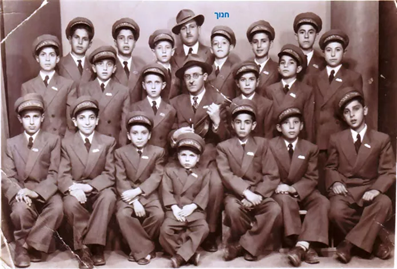
The “Ne’im Zemirot Yisrael Choir” ca. 1943. Rahamim Amar seated in the middle with his violin in hand. Hanokh Albalak standing on upper row with his name above his image. Source: Descendants of Macedonian Jews in Israel, https://monastir.org.il/
Rahamim Amar composed about three hundred songs, piyyutim and liturgical compositions. Most of his works have not been commercially recorded while many of his radio programs are preserved only in the Kol Israel archive. In addition, there is an important and yet unexplored archive of musical notations in Amar’s handwriting that became public after his death and is now located at the Department of Music of the National Library of Israel.
Notably, Amar cooperated closely with the Jerusalem-born poet and cantor Asher Mizrahi. They created several religious songs that are today considered classics among paytanim and hazzanim, especially those in the Sephardic-Jerusalem style that Amar was instrumental in its consolidation. The three most performed songs by Mizrahi and Amar are: Havivi Yah Havivi, Nagila Halleluyah, and Anna Behasdekha.
Amar also set to music the famous poem by Haim Nachman Bialik “Shabbat hamalka”.
As of 2025, several musicians in the world of piyyut have joined forces in a special project to revive the compositions of Rahamim Amar. The project is led by cantor Yaakov Mizrahi.
Sources:
Cohen, Yaacov. “Rahamim Amar – ha-Malhin veha-Yotzer” (Rahamim Amar – The Composer and the Artist), Duchan 13 (1991/2): 131-135.
Ish-Ran, Roni. “Rahamim Amar” in website of the National Library (Hebrew).
Neginot Rahamim, CD produced by Renanot, the Institute of Jewish Music, curated by Ezra Barnea, a disciple of Rahamim Amar.
Recordings of songs by Rahamim Amar at the National Library of Israel.
Announcement of revival of Rahamim Amar recordings in Kikar Hashabbat (Hebrew)
Photograph of Rahamim Amar with cantor Nissim Shalom in recording studio with children’s choir (Yad Ben-Zvi Collection)
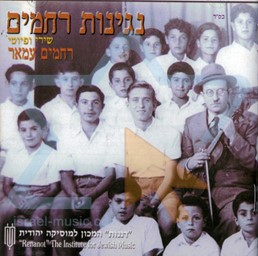
Rahamim Amar and his children’s choir in the cover of the CD Neginot Rahamim



